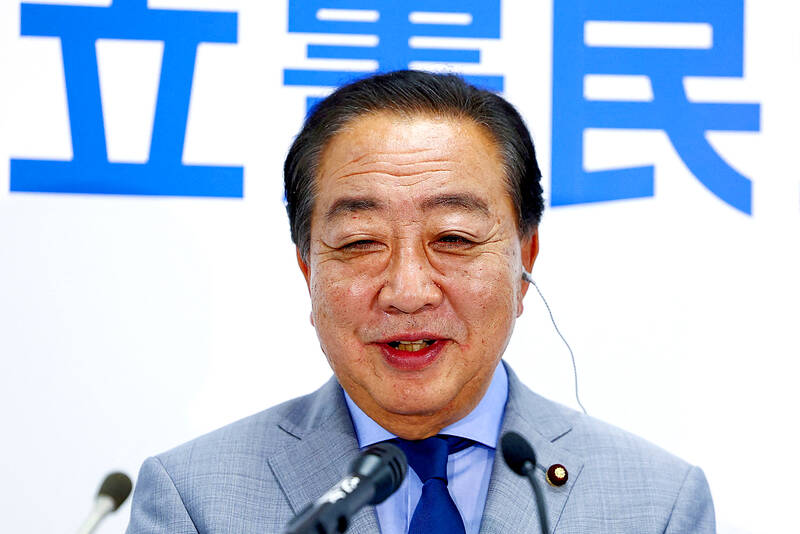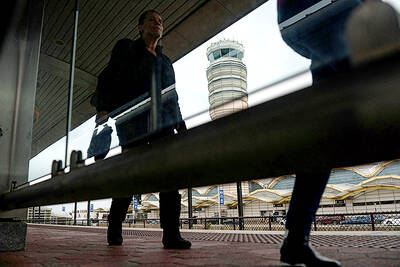Japan’s biggest opposition party would seek to support a unified candidate with other groups in a bid to block Sanae Takaichi’s election as prime minister, media reported after the ruling coalition collapsed.
Junior partner Komeito quit its 26-year alliance with the ruling Liberal Democratic Party (LDP) on Friday, putting in peril Takaichi’s bid to become the country’s first female prime minister.
Conservative Takaichi was elected as LDP president a week ago, but needs the approval of parliament to secure the top job.

Photo: Reuters
“This is a once-in-a-decade chance for a change of government,” said Yoshihiko Noda, president of the main opposition Constitutional Democratic Party of Japan (CDP), the business Nikkei daily reported late on Friday.
Komeito’s decision to quit the alliance that has governed Japan almost uninterrupted for 25 years plunged Japan into a new political crisis.
Speaking during the recording of a Nikkei podcast, which has yet to be released, Noda, who served as Japanese prime minister from 2011 to 2012, said he would urge the opposition to unite behind a single candidate.
He said that person could potentially be Yuichiro Tamaki, who heads the Democratic Party for the People (DPP) and on Friday said he was willing to stand.
However, there are significant policy differences between the DPP and the CDP, which could reportedly scupper cooperation.
The LDP has been hemorrhaging support as backing grows for smaller parties — including the anti-immigration Sanseito — and it is in a minority in both chambers of the National Diet: the House of Representatives (lower house) and the House of Councillors (upper house), even with Komeito.
In the powerful lower house, the LDP has 196 seats, the CDP 148, the DPP 27 and Komeito 24. Takaichi needs a majority of 233 seats in her favor to be appointed by parliament, which appears difficult given the numbers.
However, experts say she could still win if opposition parties fail to agree on an alternative candidate. Komeito party leader Tetsuo Saito on Friday said his fellow members would nominate him instead of Takaichi.
Saito also said that the main reason for quitting the coalition was the LDP’s failure to tighten rules on the funding of political parties.
This follows a scandal within the LDP that emerged last year involving irregular payments of millions of US dollars related to ticket sales for fundraising events.
Takaichi caused particular consternation to Komeito by appointing Japanese lawmaker Koichi Hagiuda, who was embroiled in the scandal, to a senior party post, reports said.
“For the Komeito party, which champions public integrity, it is difficult to explain this to its supporters and those working hard on the election campaign,” said Hidehiro Yamamoto, politics and sociology professor at the University of Tsukuba.
Despite its small size, Komeito — a party supported by the lay Buddhist organization Soka Gakkai — helped the LDP in the elections. About 20 percent of LDP lawmakers are estimated to lose seats without Komeito’s help, the Yomiuri Shimbun daily said.

FRUSTRATIONS: One in seven youths in China and Indonesia are unemployed, and many in the region are stuck in low-productivity jobs, the World Bank said Young people across Asia are struggling to find good jobs, with many stuck in low-productivity work that the World Bank said could strain social stability as frustrations fuel a global wave of youth-led protests. The bank highlighted a persistent gap between younger and more experienced workers across several Asian economies in a regional economic update released yesterday, noting that one in seven young people in China and Indonesia are unemployed. The share of people now vulnerable to falling into poverty is now larger than the middle class in most countries, it said. “The employment rate is generally high, but the young struggle to

ENERGY SHIFT: A report by Ember suggests it is possible for the world to wean off polluting sources of power, such as coal and gas, even as demand for electricity surges Worldwide solar and wind power generation has outpaced electricity demand this year, and for the first time on record, renewable energies combined generated more power than coal, a new analysis said. Global solar generation grew by a record 31 percent in the first half of the year, while wind generation grew 7.7 percent, according to the report by the energy think tank Ember, which was released after midnight yesterday. Solar and wind generation combined grew by more than 400 terawatt hours, which was more than the increase in overall global demand during the same period, it said. The findings suggest it is

IN THE AIR: With no compromise on the budget in sight, more air traffic controllers are calling in sick, which has led to an estimated 13,000 flight delays, the FAA said Concerns over flight delays and missed paychecks due to the US government shutdown escalated on Wednesday, as senators rejected yet another bid to end the standoff. Democrats voted for a sixth time to block a Republican stopgap funding measure to reopen government departments, keeping much of the federal workforce home or working without pay. With the shutdown in its eighth day, lines at airports were expected to grow amid increased absenteeism among security and safety staff at some of the country’s busiest hubs. Air traffic controllers — seen as “essential” public servants — are kept at work during government shutdowns, but higher numbers

Elvis Nghobo tried to get into four different professional schools in Cameroon, but could not make it. Frustrated, the 34-year-old turned to selling food at a market in Yaounde, the country’s seat of power. Nghobo blames his woes on what he calls a corrupt education system that favors children of the elite. As the central African country prepares for Sunday’s presidential election, he said he would not be heading out to vote. He called the results a foregone conclusion for 92-year-old Paul Biya, the world’s oldest president, who has ruled for Nghobo’s entire life. “He is already too old to govern, and it’s boring